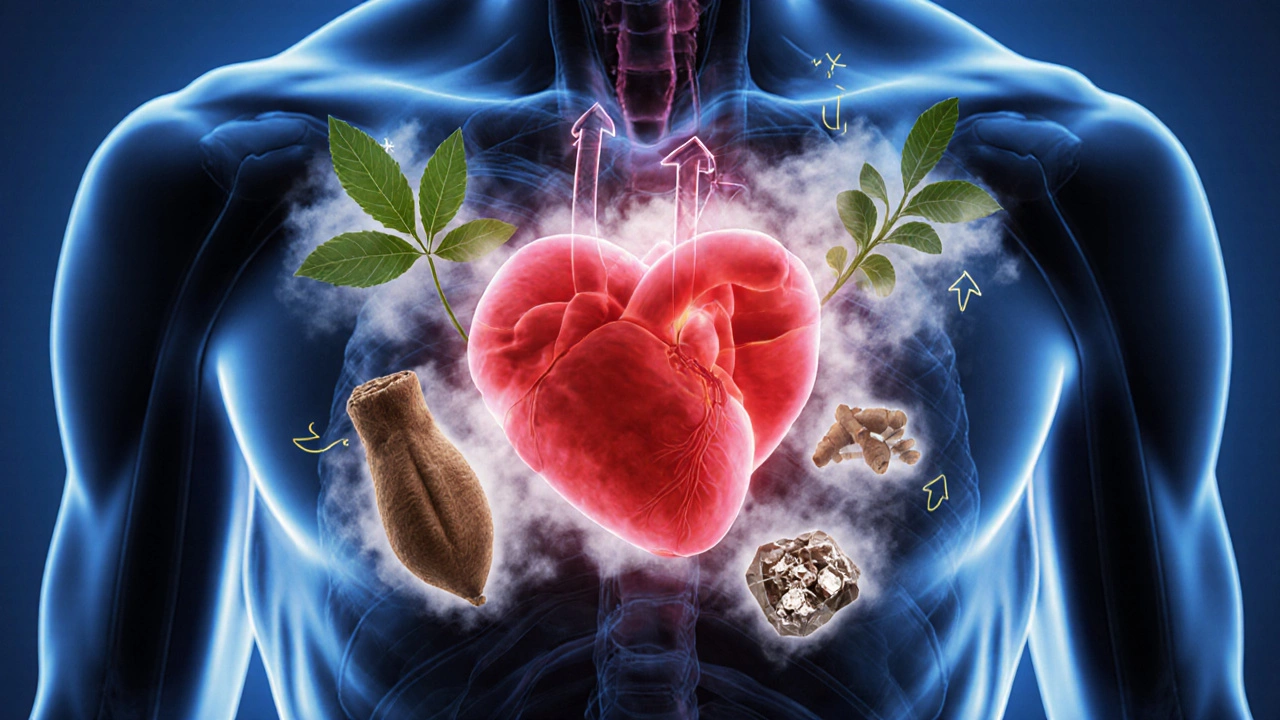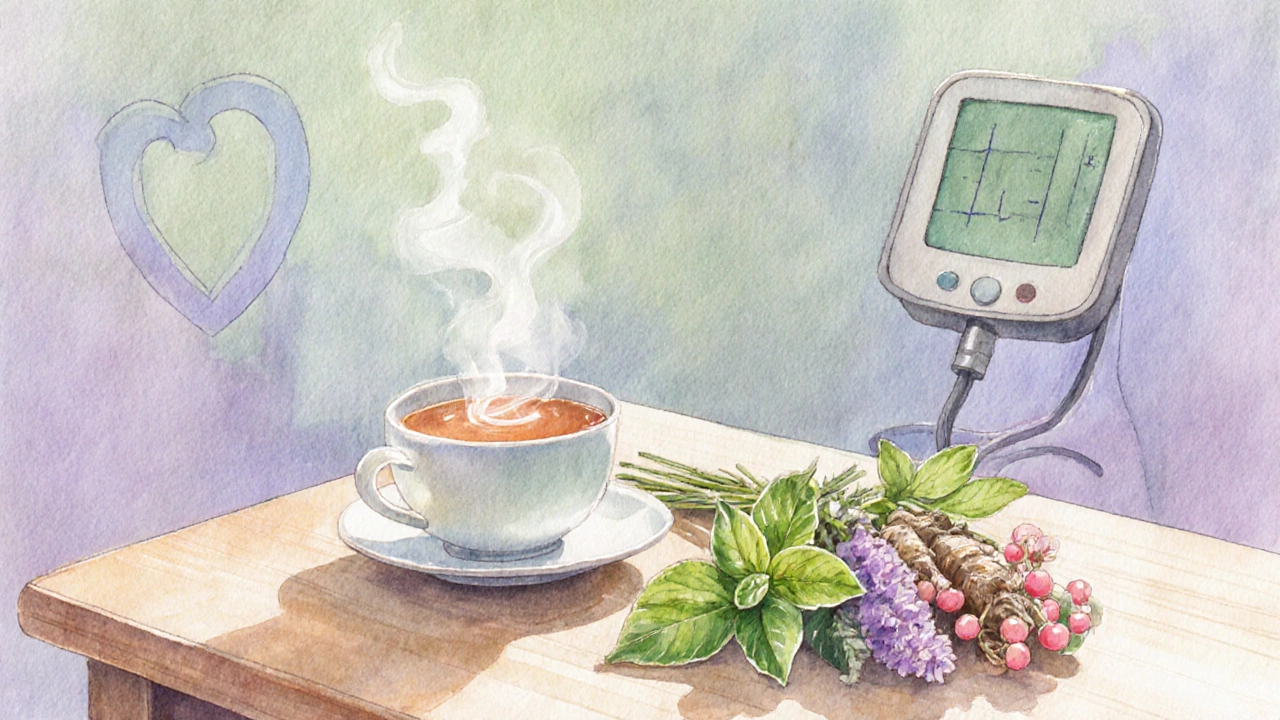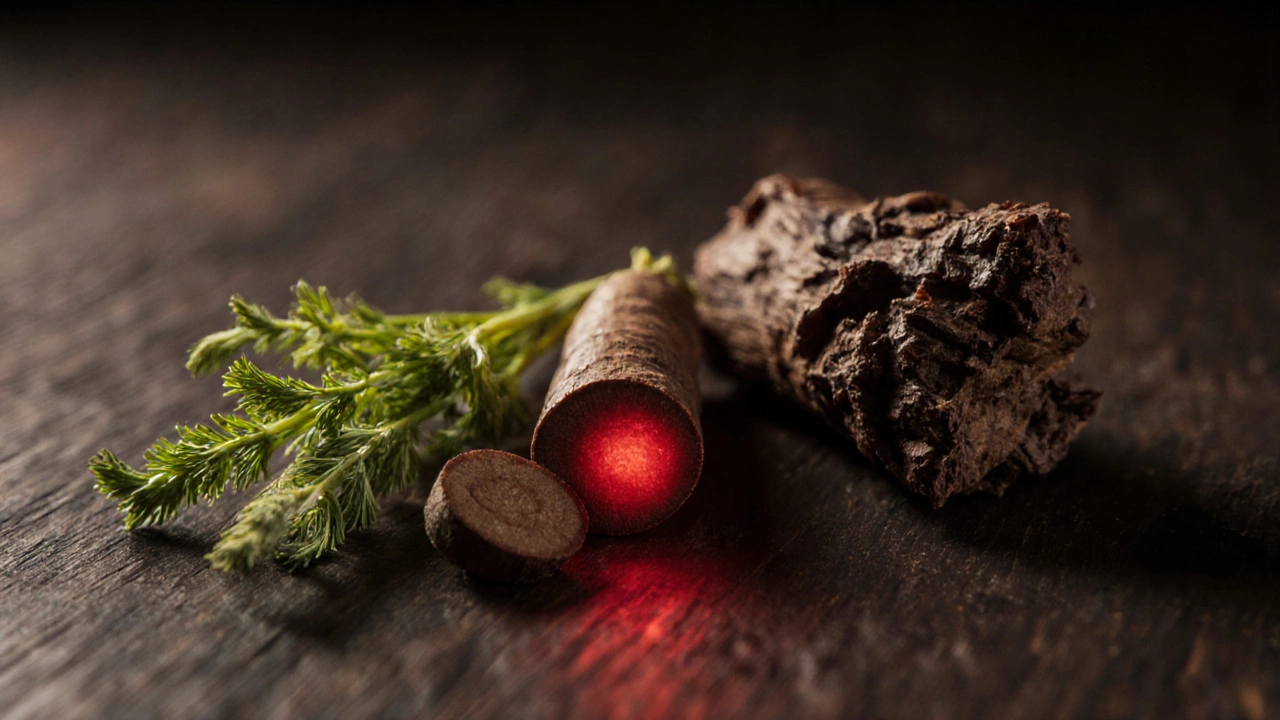Herb Safety Checker for Blood Pressure
Check if Herbs Are Safe for You
Enter your health details to see if specific herbs are safe for you to use.
Results
When you hear "herbs increase blood pressure," the reaction is often surprise. Most people think of herbs as gentle, calming helpers, yet several popular botanicals can push systolic numbers up in a matter of hours. This guide breaks down exactly which plants you should watch out for, why they have that effect, and how to keep your heart safe while still enjoying nature’s pharmacy.
What blood pressure really is
Blood pressure is the force your heart uses to push blood through arteries. Two numbers matter: systolic (the peak when the heart contracts) and diastolic (the resting pressure between beats). Normal adult ranges sit around 120/80 mmHg; sustained readings above 130/80 qualify as hypertension and raise the risk of heart attack, stroke, and kidney damage.
Why herbs can affect blood pressure
Plants contain dozens of bioactive compounds-alkaloids, glycosides, flavonoids, and essential oils-that interact with the nervous system, hormones, and blood vessels. Some stimulate the sympathetic nervous system, causing vessels to narrow (vasoconstriction) and the heart to beat faster. Others influence the renin‑angiotensin‑aldosterone system (RAAS), which controls fluid balance and vascular tone. When a herb’s active agent leans toward stimulation, it can raise both systolic and diastolic numbers.
Top herbs known to raise blood pressure
Below are the most documented herbs that can push your numbers higher. Each sub‑section includes a quick definition with structured data, the main active compound, typical dosage, and safety notes.
Ephedra - also sold as Ma Huang - is a shrub native to East Asia whose stems contain ephedrine, a powerful stimulant that mimics adrenaline.
- Active compound: Ephedrine
- Effect on BP: Short‑term increase of 10‑20 mmHg in systolic pressure
- Typical dose: 10‑25 mg ephedrine per day (often found in weight‑loss teas)
- Safety notes: Can trigger palpitations, anxiety, and, in extreme cases, heart attack. Banned in many countries for dietary supplements.
Licorice - the sweet root of Glycyrrhiza glabra - contains glycyrrhizin, which interferes with cortisol breakdown and leads to sodium retention.
- Active compound: Glycyrrhizin
- Effect on BP: Can raise systolic pressure by 5‑15 mmHg after 2‑4 weeks of regular consumption
- Typical dose: 2‑5 g of dried root daily (often consumed as tea or candy)
- Safety notes: May cause potassium loss, edema, and arrhythmias. People on blood‑pressure meds should avoid.
Yohimbine - extracted from the bark of Pausinystalia johimbe - is an alpha‑2 adrenergic antagonist that boosts norepinephrine release.
- Active compound: Yohimbine hydrochloride
- Effect on BP: Acute spikes of 8‑12 mmHg; can be unpredictable.
- Typical dose: 5‑10 mg before sexual activity or workout
- Safety notes: May provoke anxiety, trembling, and rapid heart rate. Not recommended for anyone with hypertension.
Ginseng - especially American ginseng (Panax quinquefolius) - contains ginsenosides that can stimulate the central nervous system.
- Active compound: Ginsenosides
- Effect on BP: Mild increase (3‑8 mmHg) in susceptible individuals.
- Typical dose: 200‑400 mg standardized extract daily.
- Safety notes: Interacts with anticoagulants and diabetes meds; monitor blood pressure if you have a history of hypertension.
Aconite - also called monk’s‑foot or wolfsbane - is a toxic plant whose alkaloids (aconitine) act on voltage‑gated sodium channels.
- Active compound: Aconitine
- Effect on BP: Paradoxically can cause a sharp rise followed by dangerous drops.
- Typical dose: Not recommended for consumption; traditional medicine uses minute, highly processed doses.
- Safety notes: Highly poisonous; even small amounts can cause arrhythmias and death.
Caffeine - while technically a stimulant rather than a herb, it is present in many herb‑based teas and supplements.
- Active compound: Caffeine
- Effect on BP: Short‑term rise of 5‑10 mmHg in systolic pressure.
- Typical dose: 100‑200 mg per serving (common in green‑tea extracts).
- Safety notes: Tolerance builds, but heavy users can maintain higher baseline pressures.

Quick comparison table
| Herb | Active compound | Typical effect on BP | Common dose | Safety note |
|---|---|---|---|---|
| Ephedra | Ephedrine | +10‑20 mmHg (systolic) | 10‑25 mg ephedrine | Risk of heart attack; banned in many regions |
| Licorice | Glycyrrhizin | +5‑15 mmHg (gradual) | 2‑5 g dried root | Causes potassium loss, edema |
| Yohimbine | Yohimbine HCl | +8‑12 mmHg (spike) | 5‑10 mg | Triggers anxiety, arrhythmia |
| Ginseng | Ginsenosides | +3‑8 mmHg (mild) | 200‑400 mg extract | Interacts with meds |
| Aconite | Aconitine | Variable (rise then drop) | Not for oral use | Highly toxic, can be fatal |
| Caffeine | Caffeine | +5‑10 mmHg (short‑term) | 100‑200 mg per serving | Tolerance builds, may sustain higher baseline |
How to spot risky herbs in everyday products
- Read the full ingredient list on teas, weight‑loss pills, and energy drinks. Look for names like "Ephedra extract," "Glycyrrhiza glabra," or "Yohimbe bark."
- Check the dosage. Even a “natural” herb can be dangerous if the concentration exceeds safe limits.
- Watch for “stimulating” claims - "boosts metabolism," "enhances focus," or "increases energy" often hint at blood‑pressure‑raising agents.
- Consult reputable databases (e.g., NIH Office of Dietary Supplements) for up‑to‑date safety alerts.
Safer alternatives for people who need a boost
If you enjoy a slight lift but want to keep your heart happy, consider these low‑impact botanicals:
- Rhodiola rosea - adaptogen that supports stamina without notable BP spikes.
- Holy basil (Tulsi) - helps manage stress, potentially lowering blood pressure.
- Hawthorn berry - known to improve circulation and may even help lower systolic numbers.
Always start with the smallest effective dose and monitor your numbers, especially if you have a history of hypertension.

Quick checklist - should you keep an herb?
- Does the label list Ephedra, Licorice, Yohimbine, Ginseng, Aconite, or high‑dose Caffeine? - Stop or limit use.
- Are you on blood‑pressure medication? - Talk to your doctor before adding any new supplement.
- Do you notice a rise in your home‑monitor reading after taking the product? - Discontinue and seek medical advice.
- Is the product marketed for rapid weight loss or extreme energy? - High‑risk category.
- Do you have any kidney or heart condition? - Avoid stimulatory herbs altogether.
When to seek professional help
If you experience any of the following after using an herb, call a healthcare provider immediately:
- Chest pain or tightness
- Rapid, irregular heartbeat
- Severe headache or vision changes
- Swelling in the ankles or face
- Sudden dizziness or fainting
These symptoms can signal dangerous blood‑pressure spikes or electrolyte imbalances.
Frequently Asked Questions
Can licorice tea raise my blood pressure?
Yes. Regular consumption of licorice root or strong licorice tea can increase systolic pressure by up to 15 mmHg after a few weeks, especially in people sensitive to sodium retention.
Is ginseng safe for hypertensive patients?
Ginseng may cause a modest rise in blood pressure. If you already have hypertension, use the lowest effective dose (around 200 mg) and monitor your readings closely.
Does caffeine in herbal teas affect blood pressure?
Even the caffeine in green‑tea or guarana‑based blends can raise blood pressure temporarily. The effect is usually short‑lived, but people on antihypertensive meds should keep intake below 200 mg per day.
Are there any herbal supplements that lower blood pressure?
Yes. Herbs like hawthorn, olive leaf, and hibiscus have shown modest BP‑lowering effects in clinical studies. They are generally safe but still worth discussing with your doctor.
How quickly can an herb cause a blood‑pressure spike?
Stimulant herbs such as Ephedra or Yohimbine can raise systolic pressure within 30 minutes of ingestion. Others like licorice need regular use over days to weeks to show an effect.
Understanding which herbs can push your numbers higher empowers you to choose safe, effective supplements. Keep an eye on labels, talk to your clinician, and monitor your own readings - that’s the best defense against an unexpected rise in blood pressure.
